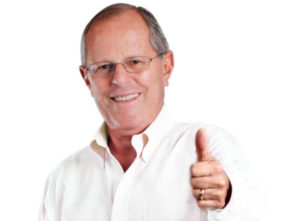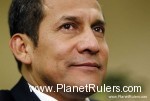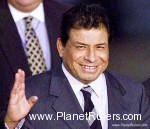Pedro Castillo, President of Peru (Elected on Jun 6, 2021 with 50.1% of the vote. Turnout is 74.6%)

Born to a peasant family in Puña, Cajamarca, Castillo began working in Peru’s informal economy as a teenager to earn funds for his studies in education and later returned to his hometown to become a primary school teacher. He attained political prominence as a leading figure in a school teachers’ strike in 2017 and ran in the 2021 presidential election as the candidate of the Marxist Free Peru party. Castillo announced his presidential candidacy after seeing his students undergo hardships from the lack of resources in rural Peru, with the election occurring amidst the COVID-19 pandemic and a period of democratic deterioration in the nation. With the support of individuals living in rural and outlying provinces, he placed first in the initial round of the presidential vote and advanced to the second round where he won against his opponent Keiko Fujimori. Castillo’s victory was confirmed on 19 July 2021, and he was inaugurated on 28 July.
Since taking office, Castillo has distanced himself from Free Peru, adopted more moderate left-wing cabinets and was later described as holding conservative or right-wing political positions. Going through four cabinets in a little over six months and his choice of appointing close acquaintances as officials led to his government facing the most unstable beginning in more than twenty years, with questions arising about his apparent inexperience for office. He has already faced two impeachment proceedings in the Peruvian Congress, although both failed to reach the necessary votes to remove him from office.
Castillo is married to Lilia Paredes, a teacher, and they have two children together. Castillo says he is Catholic while his wife and children are evangelical. He is a teetotaler, practicing abstinence from consuming alcohol. His family lives in a nine-room home in the Chugur District tending a farm with cows, pigs, corn, and sweet potatoes. Castillo often wears a straw hat called a chotano, a poncho, and sandals constructed from old tires.
Source: https://en.wikipedia.org/wiki/Pedro_Castillo
Pedro Pablo Kuczynski, Former President of Peru (Elected on Jun 5, 2016 with 50.1% of the vote. Turnout is 80.1%)

Kuczynski worked in the United States before entering Peruvian politics. He held positions at both the World Bank and the International Monetary Fund before being designated as general manager of Peru’s Central Reserve Bank. He later served as Minister of Energy and Mines in the early 1980s under President Fernando Belaúnde Terry, and as Minister of Economy and Finance and Prime Minister under President Alejandro Toledo in the 2000s.
Kuczynski was a presidential candidate in the 2011 presidential election, placing third. His opponents Ollanta Humala and Keiko Fujimori went on to the June 5, 2011 runoff election, in which Humala was elected. Kuczynski went on to stand in the 2016 election, where he defeated Fujimori in the second round.
His father, Maxime Hans Kuczynski, born in Poznań, today in Poland and part of Germany at that time after partition of Poland in the 18th century, was a bacteriologist who served in the German army during World War I on the Balkan front. He was a renowned pathologist and tropical disease specialist, in particular expert on Verruga peruana or Carrion’s disease. He trained at the Universities of Rostock and Berlin, where he was professor of pathology. An officer in the German army on the Eastern and Turkish fronts in the First World War, he travelled widely in Russia, China, West Africa, and Brazil. Leaving Germany in 1933 because of his Jewish roots, he was invited to Peru in 1936 by President Óscar R. Benavides to set up the public health service in the interior of the country. Maxime Hans Kuczynski reformed the San Pablo leprosarium on the Amazon at the Brazilian frontier, set up a public health colony on the Perene river, and was later professor of tropical medicine at National University of San Marcos in Lima.
Pedro Pablo Kuczynski Godard has been married twice, first to Jane Dudley Casey (daughter of Joseph E. Casey, member of the U.S. House for the 3rd district of Massachusetts), their offspring being corporate executive and technology entrepreneur Carolina Madeleine Kuczynski, the journalist Alex Kuczynski,and John-Michael Kuczynski. His current wife is Nancy Lange, with whom he has had a daughter. Contrary to false information spread during Mr. Kuczynski’s second presidential race, Nancy Lange is not a cousin of the actress Jessica Lange: they are only very distantly related and do not know each other. Kuczynski’s younger brother Miguel Jorge is a fellow of Pembroke College, Cambridge; and their first cousin is Jean-Luc Godard, the renowned French-Swiss film director. Kuczynski’s brother-in-law Harold Varmus received the Nobel Prize for cancer research in 1989.
Source: https://en.wikipedia.org/wiki/Pedro_Pablo_Kuczynski
Ollanta Humala, Former President of Peru (since Jul 28, 2011)
Ollanta Moisés Humala Tasso (born June 26, 1962) is a Peruvian politician and the President-elect of Peru. Humala, who previously served as an army officer, lost the presidential election in 2006 but won the 2011 presidential election in a run-off vote. He was elected as President of Peru in the second round, defeating Keiko Fujimori.
The son of Isaac Humala, a labour lawyer, Humala enlisted in the Peruvian Army in 1982. In the military he achieved the rank of Lieutenant Colonel; in 1992 he fought in the internal conflict against the Shining Path and three years later he participated in the Cenepa War against Ecuador. In October 2000, Humala led an unsuccessful military revolt by 39 soldiers in the southern city of Tacna against President Alberto Fujimori; he was pardoned by the Peruvian Congress after the downfall of the Fujimori regime.
In 2005 he founded the Peruvian Nationalist Party and registered to run in the 2006 presidential election. The nomination was made under the Union for Peru ticket as the Nationalist party did not achieve its electoral inscription on time. He passed the first round of the elections, held on April 9, 2006, with 30.62% of the valid votes. A runoff was held on June 4 between Humala and Alan García of the Peruvian Aprista Party. Humala lost this round with 47.47% of the valid votes versus 52.62% for García. After his defeat, Humala remained as an important figure within Peruvian politics.
In 2011, Humala campaigned as a center-left leader with the desire to help to create a more equitable framework for distributing the wealth from the country’s key natural resources, with the goal of maintaining foreign investment and economic growth in the country while working to improve the condition of an impoverished majority.
Source: http://en.wikipedia.org/wiki/Ollanta_Humala
Alan Gabriel Ludwig Garcia Perez, Former President of Peru
Alan Gabriel Ludwig Garcia Perez was born on May 23, 1949 in the city of Lima. He went on to university studies at the Pontificia Universidad Católica and later earned his law degree at the National University of San Marcos in 1971. Afterwards, he moved to Europe, attending the Universidad Complutense in Madrid, where he studied and completed his thesis on constitutional law, earning him a doctorate in political science.In 1973, he went on to the Sorbonne University of Paris, where he obtained a degree in sociology.
Between 1977 and 1980 was elected Organization Secretary of the Peruvian Aprista party. In 1979 was elected as a member of the Constituency Assembly. Between 1980 and 1985 was National Deputy. Between the years 1982 and 1985 was General Secretary of the Aprista Party of Peru.
In 1985, at the age of thirty-five, was elected president of the Republic of Peru for the 1985 –1990 period, function that was democraticly excersised during his term.
On April 1992, due to the coup d’etat perpetrated by Mr. Alberto Fujimori, was granted political asylum in Colombia and France until January 2001, when he returned back to Peru.
President Garcia was candidate for the presidency of the Republic of Peru, representing the Peruvian Aprista Party, obtaining 47% of the votes on the presidential elections on June 2001.
In 2004 was elected president of the Peruvian Aprista Party.
He holds the honorary position of President of the Socialist International.
He also was Director of the Institute of Government of the University San Martin de Porres.
On the presidential elections taken place on June 2006, Mr. Garcia was elected President with the 52.6% of the votes.
President García is the author of several books, among them:
Sierra Exportadora (2005)
Para Comprender el Siglo XXI (2004)
Mi Gobierno hizo la Regionalización (1998)
La Falsa Modernidad (1997)



